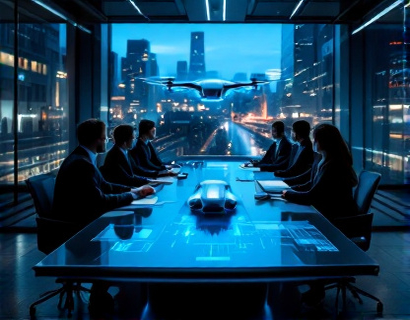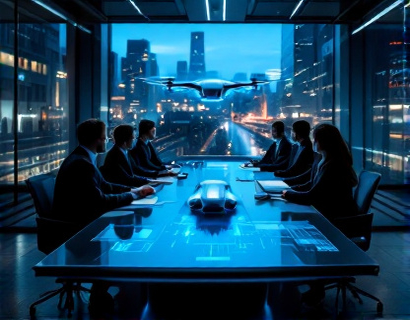AI-Powered Agent Revolutionizes Aeronautics: Optimizing Businesses with Intelligent Solutions
The aeronautics industry, a cornerstone of global transportation and commerce, is undergoing a significant transformation driven by the integration of artificial intelligence (AI) technologies. This revolution is not just about automating routine tasks but about redefining how businesses operate, make decisions, and innovate. AI-powered agents are at the forefront of this change, offering tailored solutions that enhance efficiency, optimize operations, and drive growth. For aeronautics businesses, embracing these intelligent solutions is not just an option but a necessity to stay competitive in a rapidly evolving market.
Streamlining Operations with AI Agents
One of the most immediate benefits of AI agents in the aeronautics sector is the streamlining of operations. Traditional processes such as maintenance scheduling, flight planning, and supply chain management are complex and time-consuming. AI agents can analyze vast amounts of data in real-time, identifying patterns and optimizing workflows to reduce delays and costs. For instance, predictive maintenance powered by AI can forecast equipment failures before they occur, allowing for proactive maintenance that minimizes downtime and extends the lifespan of aircraft components.
Consider a scenario where an AI agent monitors the performance data of an aircraft's engines. By analyzing historical and real-time data, the agent can detect anomalies and predict when a component is likely to fail. This allows maintenance teams to schedule repairs during planned downtime, avoiding unexpected breakdowns during critical missions. Such precision not only enhances operational reliability but also significantly reduces maintenance costs.
Enhancing Decision-Making with Data Insights
Decision-making in the aeronautics industry is often based on complex data sets that require deep analysis. AI agents excel in this area by providing actionable insights derived from big data. These insights can inform strategic decisions ranging from route optimization to fleet management. For example, an AI agent can analyze weather patterns, air traffic data, and fuel prices to suggest the most efficient flight paths, reducing fuel consumption and lowering emissions. This not only benefits the environment but also cuts operational costs.
Moreover, AI agents can process customer data to identify trends and preferences, enabling airlines to tailor their services and marketing strategies. By understanding passenger behavior, airlines can optimize seat configurations, improve in-flight services, and enhance overall customer satisfaction. This data-driven approach to decision-making ensures that businesses remain agile and responsive to market changes.
Tailored Solutions for Unique Challenges
Every aeronautics business faces unique challenges, from regulatory compliance to cybersecurity threats. AI agents can be customized to address these specific issues, providing solutions that are both effective and efficient. For instance, in the realm of cybersecurity, AI agents can monitor network traffic in real-time, detecting and mitigating threats before they impact operations. This proactive approach to security is crucial in an industry where the stakes are high and the consequences of a breach can be severe.
Regulatory compliance is another area where AI agents shine. The aeronautics industry is heavily regulated, with stringent requirements for safety, environmental impact, and operational standards. AI agents can help businesses stay compliant by continuously monitoring regulatory changes and ensuring that all processes and documentation meet the necessary criteria. This reduces the risk of non-compliance and associated penalties, allowing businesses to focus on growth rather than legal hurdles.
Case Study: Optimizing Supply Chain Management
To illustrate the practical benefits of AI agents in aeronautics, consider a major airline that implemented an AI-powered supply chain management system. The AI agent analyzed historical data on inventory levels, demand forecasts, and supplier performance to optimize the procurement process. By identifying the optimal times to order supplies and the most cost-effective suppliers, the airline reduced inventory costs by 15% and improved delivery times. The AI agent also detected potential supply chain disruptions, allowing the airline to take preemptive actions and maintain service continuity.
This case demonstrates how AI agents can transform supply chain management, a critical component of aeronautics businesses. The ability to make data-driven decisions and respond quickly to changes is invaluable in an industry where timing and reliability are paramount.
Driving Innovation through AI
Beyond operational efficiency, AI agents are catalysts for innovation in the aeronautics sector. By leveraging machine learning and advanced analytics, businesses can develop new products and services that meet evolving customer needs. For example, AI can assist in the design of more fuel-efficient aircraft by simulating various design scenarios and identifying the most promising configurations. This not only accelerates the development process but also leads to more sustainable and cost-effective solutions.
Another area of innovation is in the development of autonomous systems. AI agents can play a crucial role in the testing and deployment of autonomous drones and unmanned aerial vehicles (UAVs) for tasks such as surveillance, delivery, and inspection. These systems can operate with a high degree of precision and safety, opening up new possibilities in industries ranging from agriculture to construction.
Enhancing Passenger Experience
The passenger experience is a key differentiator in the aeronautics industry, and AI agents can significantly enhance this aspect. By analyzing passenger data, AI can personalize services such as seat selection, in-flight entertainment, and meal preferences. This level of personalization not only improves customer satisfaction but also increases loyalty and repeat business. Additionally, AI-powered chatbots and virtual assistants can provide real-time support to passengers, addressing queries and resolving issues promptly.
Safety and security are also enhanced through AI. Facial recognition technology, powered by AI, can streamline check-in and boarding processes, reducing queues and improving security. AI agents can monitor security cameras in real-time, detecting suspicious behavior and alerting security personnel, thereby enhancing the overall safety of airports and aircraft.
Challenges and Considerations
While the benefits of AI agents in the aeronautics industry are clear, there are challenges and considerations that businesses must address. One of the primary concerns is data privacy and security. Aeronautics businesses handle sensitive information, and ensuring the protection of this data is critical. AI agents must be designed with robust security measures to prevent data breaches and comply with regulations such as GDPR.
Another challenge is the integration of AI systems with existing infrastructure. Many aeronautics businesses operate with legacy systems that may not be compatible with new AI technologies. A phased approach to integration, involving thorough testing and validation, is essential to ensure smooth operations and minimize disruptions.
Building a Culture of Innovation
To fully leverage the potential of AI agents, aeronautics businesses must foster a culture of innovation. This involves investing in employee training and development to build a workforce skilled in AI and data analytics. Encouraging a mindset of continuous learning and experimentation will enable businesses to adapt to new technologies and stay ahead of the curve.
Collaboration with tech partners and research institutions can also accelerate innovation. By partnering with leading AI research labs, aeronautics businesses can access cutting-edge technologies and expertise, driving forward the development of intelligent solutions tailored to their specific needs.
Conclusion
The integration of AI agents in the aeronautics industry represents a paradigm shift, offering unprecedented opportunities for optimization, innovation, and growth. By streamlining operations, enhancing decision-making, and driving innovation, AI agents are empowering aeronautics businesses to thrive in a dynamic and competitive market. As the industry continues to evolve, embracing AI will not only be a strategic advantage but a necessity for success.










































